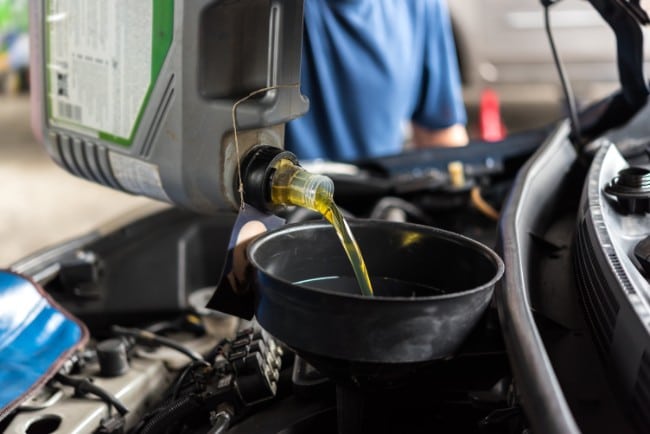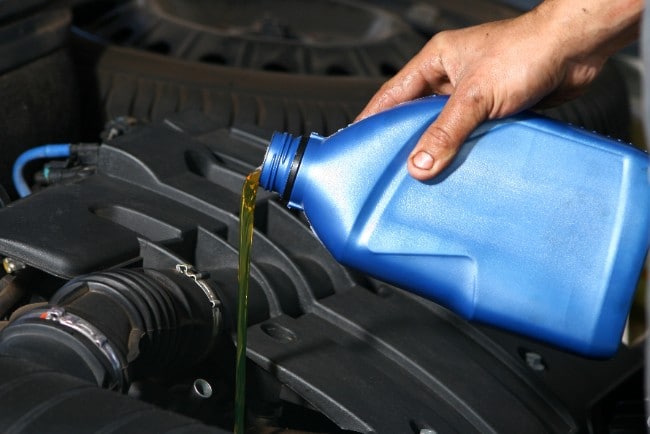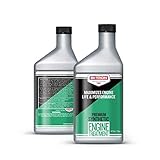Engine oil additives have dramatic benefits for the overall functioning of the engine in your car.
Oil additives also work to mitigate any problems you are experiencing with lifter ticking noise.
If you’re in a rush check out our table of the best oil additives to help silence noisy lifters below:
If you notice a knocking sound when you start your car, which, perhaps, lasts for an extended time as you drive, a common cause is malfunctioning tappets – also known as a lifter tick.
Taking care of noisy lifters without resorting to a complete oil change is possible. All that is required is to find the best oil additive to stop engine knocking, and we’ve got you covered with our reviews.
These products help clear away sludge and dirt in the engine and simultaneously eradicate that annoying tapping sound.
After that, we’ll share some handy hints to save you time and money on your quest for the best oil for noisy lifters.
1. Marvel Mystery Oil Review
The enticingly titled Marvel Mystery Oil (MMO) has been around for the better part of a century. It’s still going strong today as an additive with manifold benefits.
As with all the engine oil additives that we’ll be outlining today, benefits and results can vary considerably. It is best to be aware of this variation to avoid disappointment in any one product. One thing you can be certain of with MMO is that you won’t end up harming the engine in any way.
The oil enhancer and fuel treatment fit neatly with all types of engines, from gas to diesel. Since the additive serves to increase overall engine efficiency, it can improve fuel economy and overall engine performance. It is a feature that benefits older cars more than newer models.
Regardless of the age of your vehicle, you’ll ensure complete cleanliness of the engine and system by replacing just twenty percent of your engine oil with MMO.
It can be used with any conventional or synthetic oil to quiet noisy lifters. A myriad of lifter tick issues appears through accumulated oil deposits. The build-up of oil can stop the pushrod or the camshaft from direct contact with the lifter.
Give MMO a shot before you go to the time, trouble, and expense of replacing either the lifter or the rod.
While not its core functionality, MMO can work to thin the oil, too. It will start smoothly over the cold winter months without freezing and seizing. Another benefit of this product is the way it inhibits rust from forming in your engine.
Another tip with this additive is it can help you with the removal of spark plugs that have seized. Spray a little Marvel Mystery Oil around the edges of the mechanism, and it should loosen it up.
Pick up Marvel Mystery Oil in a range of sizes and bundles, from single 1-gallon bottles through to multipacks for even greater value.
Pros:
- Increased gas mileage is a superb intrinsic benefit of MMO
- Cleans your engine and the fuel system simultaneously
- Thins the oil so it won’t freeze over during the winter months
- Minimizes engine sludge and enhances lubrication for a smoother start function
- Properly lubricates the rubber parts in your engine and stops the mechanism from drying out
Cons:
- You might not experience a strong improvement in fuel economy
- There’s a chance you’ll notice limited benefits from using this additive in your engine
2. Liqui Moly Additive Review
Liqui Moly Hydraulic Lifter Additive delivers a full-frontal attack on noisy lifters. It works by cleaning the lubrication duct along with holes in the oil circuit, which optimizes the hydraulic tappet functionality overall.
The additive is suitable for gas and diesel engines and works well alongside any commercial oil. You won’t invoke any negative effects if your car packs a turbocharger or a catalytic converter. If the engine uses 1.6 liters or more of oil, this product is the perfect fit.
In many ways, the baseline for any engine oil additive is that you need to make sure it won’t do any harm. Whether you extract the promised results or not, this is one area you obviously need to be confident about, so you won’t end up creating more problems than you fix.
You’re in safe hands with Liqui Moly.
Unlike much of the competition, Liqui Moly is restrained with its performance claims. Where many competing products are additives that might help combat lifter tick, Liqui Moly is designed purely with lifter tick in mind.
So, there’s a chance of increased fuel economy or a general uptick in engine performance, for example, but these are not the primary benefits of hydraulic Lifter Additive, as the name makes abundantly clear.
A little goes a long way with Liqui Moly, too, and it manages to clear the valve bores and oil passages. You won’t notice any of those annoying tapping sounds emanating from the hydraulic tappets.
Before deciding on whether to invest in Liqui Moly, you should ask yourself what you really want from the product. Do you want to take a chance on additive from an unknown brand, promising multiple engine-related benefits with no real proof to back it up? We didn’t think so.
Instead, invest in one of the few additives from an industry heavyweight that works. As with most products, when the focus is as sharp as it is here, you’ll see far superior results than a more general solution. Kiss noisy lifters goodbye, and say hello to an engine that runs lean, clean, and silent.
Pros:
- Expressly formulated to solve lifter noise issues
- Works with a broad spread of vehicles and engine oils, so you shouldn’t struggle with compatibility
- Can boost the performance of older or ailing engines
- Might improve fuel economy as a result of increased engine efficiency
- Ensures a quieter start and a smooth idle
Cons:
- Won’t work on motorcycles with wet clutches
3. Rislone Engine Treatment Review
Rislone Engine Treatment has been in mass production for almost a century now, so there’s no doubt it is an excellent oil additive. What makes Rislone so reliable in this competitive industry, though?
Firstly, there is the flexibility to throw this additive in with all engine types and every brand of oil. As with all additives, you’re more likely to notice obvious results with older vehicles than with newer models.
How Rislone works with an older car is fantastic, though. The sludge from your engine oil is dislodged and removed, while future build-up is prevented from forming. These cleaning properties alone can go a long way toward limiting noise from lifters.
Older vehicles indicate that friction and general wear is abated with this product. It offers your struggling engine a new lease on life.
Rislone makes a neat fit with a newer ride with high mileage, too. The manufacturer labels this engine oil additive a “multivitamin for your car”, and we feel this claim is accurate. If you’re not expecting miracles, but you’re looking for a boost in overall performance and a reduction in valve noise, Rislone can deliver.
The usual disclaimer here is: not all users experience any form of meaningful results. Keep your expectations reasonable.
If you’ve got a vintage vehicle, and any car with excessive mileage or a filthy engine, Rislone works effectively. Newer cars may not experience such dramatic effects, however, and you might end up wondering what the additive achieved.
The good news with this product is that the worst that will happen is a disappointing absence of results. You won’t do your car any harm, and you won’t invalidate the warranty. What is there to lose?
Pop in a dash of Rislone with every oil change for the best results. You could start noticing a difference immediately, so it is worth the effort. If you’re looking for the best oil for noisy lifters, there’s a good reason Rislone has been in business for almost one hundred years.
Pros:
- Fights back against lifter tick without voiding your warranty
- Dramatically decreases friction and wear on metal surfaces
- Keeps deposits of sludge to an absolute minimum
- Works well with extremely dirty engines when the dosage is doubled
- Effects take place rapidly and are visible within the first one hundred miles post-treatment
Cons:
- Not as effective with newer vehicles
- Some users have complained about a failure in noise reduction
4. XL Nanolube Review
The aftermarket oil additive segment is growing, and XL Nanolube is a stellar presence among the industry greats. What makes this treatment worth considering if there are annoying noises in your lifters?
It is marketed as an overall engine optimizer, so reducing noise is not the key selling point here. The strapline is to make old engines new again while preventing the mechanisms from premature aging and general wear. Arguably, the unique selling point for Nanolube is that it’s the only additive on the market that can stop oil from burning inside your engine.
The additive itself is built to withstand extreme heat where much of the competition is not. Competing products often end up burning, contributing to the exact problem the additive is trying to solve.
By kicking out a nanofilm that covers metals and ensuring this doesn’t drip off when you power down the engine, you’ll reduce the chance of any damage from dry starts. Also, this feature will radically reduce engine noise at startup, whether this alludes to the ticking or other sounds resulting from poor lubrication.
Like many others, this additive is marketed as a detox for your engine, and that’s a surprisingly accurate description of its performance. If you have an older car, you should notice an all-round improvement on performance immediately. This effect will be far less noticeable if you have a new vehicle already running optimally.
Since this additive is only recommended for engines six years and older, another product will be more suitable if you’re in a newer ride.
You’re spoiled for choice with Nanolube, though, as this additive works well with all types of engines, even the aluminum found in Range Rovers. It also fits well with all varieties of oil.
Once it’s in, Nanolube will stabilize the engine and prevent contamination in several specific areas. You will probably even notice a reduction in emissions as everything starts working in harmony post-treatment.
Aside from customer care that could be improved, there’s little to knock about this oil additive for silencing noisy lifters.
Pros:
- Works with both diesel and gas engines, as well as all types of engine oil
- Reduces emissions by stabilizing the temperature and minimizing oil breakdown
- Expect reduced fuel costs and possible performance improvements with cars six years and older
- Robust performance under extreme heat
- Serves as a superb general engine detox treatment
Cons:
- You won’t get any rust protection with this additive
- Customer service is questionable
5. Bitron Oil Additive Review
While there’s no substitute for running your engine on top-notch oil and changing it frequently, sometimes there’s an annoying knocking noise still echoing from the lifters. Trying an additive is the first step before going for a complete oil change or more dramatic measures. Bitron Oil Additive polarizes opinion.
There are a massive number of committed fans to the product, and the company has shifted over $100 million of additives in its lifetime. Other consumers are more skeptical, pointing to a lack of hard data to back up the product’s claims.
We find it a challenge to discount any additive with such a substantial and vocal fanbase, however. Also, with a quarter-century in the game, it’s difficult to question Bitron’s heritage.
With Bitron, most claims seem valid, but the tone is often sensationalized. Expecting to knock twenty percent off your fuel bill, for example, is hopeful at best. As with all claims made about this additive, however, there is confirmation for the potential to improve fuel economy to a smaller extent.
The lowered operating temperature and reduced noise could save you from noisy lifters, too. Again, no magic remedy is promised by Bitron, but there’s a reasonable chance you can bring the incessant engine noise down a little.
The chloroparaffin in this additive is a highly effective lubricant, so you should notice an overall improvement in the way your engine runs. Expect it to run more smoothly and quietly than it did before.
Reducing engine wear by ninety percent, as claimed by Bitron, is unlikely. There’s little doubt this additive can help to reduce stress and strain on your engine, though.
If you scythe through the hyperbole and look at what’s delivered, Bitron is still well worth a shot if your engine is creating a noise you can’t abide.
Pros:
- Chloroparaffin emits fantastic lubricating properties
- Won’t foam up like some competing additives
- Synthetic oil treatment coats all surfaces, to reduce wear and tear by cutting down friction
- Protects your engine across a vast temperature range
- You might achieve some overall performance benefits as your engine works more easily and efficiently
Cons:
- Claims about achieving twenty percent improvement on the fuel economy are ambitious
- Relatively little reputable science to back up the other claims of this product
What Is Lifter Tick?
Before we walk you through what to look for on the buying trail, here’s a quick reminder about the lifter tick issue: when sludge and other debris accumulate inside the valve cover of your engine, the lifters can start to make a loud ticking noise.
The dirt that accumulates in the hydraulics of the lifter cause the internal oil pressure to drop.
Lifter tick can occur as a natural part of the engine aging, and a damaged pushrod can also be responsible for the noise.
We mention these other issues because using an additive is by no means a universal cure for lifter tick. It is the best first line of attack, though.
How to Use Oil Additive to Stop Lifter Tick (A Short Step by Step Guide)
You should now have a sound overview of the best oil additives to silence noisy lifters. Five products, five reviews, and a whole lot of information. So, which product is the best choice and how soon will the noisy ticker disappear?

Unfortunately, the answer depends on your type of vehicle, individual results, your preferences, and other factors like climate.
Depending on which type of additive you choose, you might also expect to see more general benefits. As your engine starts to work more efficiently and makes less noise, you could also see an increase in fuel economy and an overall smoothness, for example.
How do you use these additives to stop the lifter tick, then?
Fortunately, using an oil additive to stop the annoying lifter tick after you’ve diagnosed the source is extremely simple. Throw it in, drive for a while, and take notes.
If the oil additive doesn’t cure the sound, it may dampen it. The product may also give your engine a boost, leading to no adverse effects, and with a reasonable chance of upside.
These four steps lay a strong foundation for lifter tick eradication when you use an oil additive:
- The best time to use an oil additive is during a routine oil change. Substitute the oil additive as instructed by your chosen product.
- Follow instructions closely on your additive of choice and add up to twenty percent of the total oil volume as the additive portion.
- You’ll then need to monitor whether the additive has any effect on the noise as you drive a few miles and wait for it to spread. When the additive starts to break down the sludge and grime in the engine, it should potentially purge the noise from your lifters and make the vehicle quieter.
- If you don’t notice any appreciable difference by the time the additive should have kicked in, why not take a look at our guide to other causes of lifter tick for further information?
Using additives is simple enough, and you should have assembled a valuable shortlist now with the products we highlighted above. Remember, there’s no reason not to try an additive as your first line of defense against lifter tick noise. It cannot do any harm to your engine, and the benefits may surprise you.
What should you bear in mind if you want to guarantee your vehicle the most effective oil additive possible?
What to Look For in Effective Oil Additives

An aftermarket oil additive is a proprietary blend designed to enhance your regular engine oil.
The additive helps to intensify lubrication and reduce friction, which can bring about many benefits. From reduced noise and improved fuel economy to longer intervals between oil changes and performance boosts, additives promise a myriad of positive effects.
The first thing you should focus on is the ingredients. It is where any additive will stand and fall against scrutiny.
Ingredients
- Lubricating Oil Additives: LOAs are regularly used in additives to minimize friction between the metal components in your engine. Phosphorus is the most commonly used LOA. While this is highly effective, phosphorus can create an accumulation of carbon if you’ve got a catalytic converter, so molybdenum and boron are alternative LOAs without the same issue.
- Zinc: Zinc often comes blended with phosphorus. The main purpose of zinc is to increase overall engine efficiency and performance. For the reason outlined above, avoid using too much zinc or risk damaging your catalytic converter.
- Magnesium Sulfate: Magnesium sulfate is a regular presence in oil additives for the way in which it can remove impurities from the oil. If your engine has problems manifested in noisy lifters, magnesium sulfate can cut through the sludge contributing toward that infuriating sound. Magnesium sulfate can also stop rust from forming, increasing the overall lifespan and performance of the engine.
- Extreme Pressure Agents: EPAs reduce friction between metal components. Chlorine, sulfur-phosphorus, and potassium-borate are the most commonly used of these EPAs. By imparting a film over the surface of the metal, wear and tear is reduced while efficiency is increased as components glide seamlessly over one another.
- Nanoparticles: If you see nanoparticles advertised on your oil additive of choice, these are minuscule particles of titanium oxide. The benefit claims include improved fuel economy and increased horsepower. These nanoparticles won’t cause any damage to catalytic converters, and they’ll also serve to dampen the unwanted noise.
How Is The Additive Described?
Part of the difficulty when you’re looking for oil additives is navigating the marketing materials and separating truth from a myth or exaggeration.
When you wade in first, you might be overwhelmed by the breadth of choice at your disposal.
Simplify things and focus on these five categories:
- Complete Engine Treatment: These comprehensive additives bring friction right down and form a protective barrier around key engine components to reduce heat.
- Engine Break-In Additive: These break-in additives mix with your engine oil to safeguard your camshaft lifters. It can also help with valve train lubrication.
- Engine Oil Stop Leak: This oil-stop additive seals the leak in the engine.
- Heavy-Duty Oil Stabilizer: This robust additive drastically minimizes friction. It boosts lubrication to ensure improved performance overall.
- High Mileage Oil Stabilizer: This additive is targeted at owners of older vehicles with heavy mileage. It aims to reduce engine noise, improve fuel economy, and give the performance a small boost at the same time.
Your Product Should Reduce Friction
Regardless of the type of additive you choose, it should as bring down friction at a minimum.
Excessive friction can cause metal parts to chip and damage. These nicks can add to engine noise. A lubricating additive ensures these metal parts have all the juice they need to work without degrading.
Does The Additive Reduce Emissions?
The better oil additives reduce emissions, but how do you know if your additive is one of these products? Keep your eyes peeled for EPA certification.

The EPA performs the twin purpose—assuring you the additive has no harmful ingredients and decreasing your eco-footprint.
You might also see additives certified by the PEA. It is a roughly comparable certification ensuring the additive conforms to the same environmental standards.
Does Your Additive Improve Fuel Economy?
How about miles per gallon? An improvement in fuel economy is sometimes a secondary benefit of using a fuel additive.
As with all aspects of your buying decision, analyze the truth beneath the marketing claims. Always take data with a pinch of salt, and look at the suggested benefits as a possibility rather than a guarantee.
Fuel economy is one of these grey areas. You may or may not end up slashing your fuel bill.
If you have a showroom-fresh car, you’re wildly unlikely to notice any kind of mileage difference. If you’re in possession of a much older car with higher mileage, the effects of an additive are more direct. As the older engine is lubricated and becomes more efficient, you’ll likely be spending less at the pump.

Think About The Climate
Some additives don’t work well in certain weather conditions. Cold water is always a danger for oil and oil additives, which don’t cope when the mercury tumbles. Most additives respond better with higher temperatures.
If you live somewhere with an extremely cold climate, look closely at the type of additive to make sure it’s appropriate.
Compatibility
While many additives are designed to work with both gas and diesel engines, this is by no means universal. Check carefully before purchasing an incompatible product.
The car make and model is equally important. Most additives suit all vehicles, but you need to establish compatibility before finalizing the addition.
The other salient factor is the age of your car. Some additives are not designed to work with cars less than six years old. Others might return benefits regardless of age.
Take your time to assess compatibility before you get too excited.
As an Amazon Associate I may earn a small fee from qualifying purchases at no extra cost to you. This helps us run the site, so thanks for your support!




